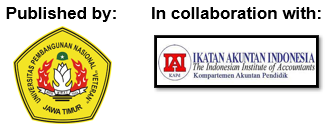Education Budget Through Central or Local Government Spending: Which Is More Effective in Improving the Quality of Human Life?
DOI:
https://doi.org/10.33005/jasf.v4i2.227Keywords:
Education Spending, Human Development, Regional Budget, National BudgetAbstract
Regional autonomy demands a division of authority between the Center and the regions, which in turn has an impact on budgeting policies. On the one hand, central government spending is oriented towards equity, but on the other hand, the regions understand very well their respective characteristics. The government's budget is always results-oriented, so this research can later be used as a benchmark in planning budgeting. In terms of spending on Education in Indonesia, the budget is channeled through central government spending and local government spending. This research is structured to see between the Central Government or Local Government, more significant in accelerating human quality (IPM) in Indonesia. This study uses Vector Auto
Regression with Bayesian Vector Auto Regression model specifications to determine the effect between the variables studied. The variables used in this study are the Central Government Expenditure budget, Regional Government Expenditure on Education through Transfers from the Center to the Regions, Adjusted Per Capita Expenditure, and the Human Development Index from 2007 – 2020. The estimation results show a tendency for local government spending to be more able to increase Human Development Index compared to the Education budget through central government spending. This finding indicates that in the end, the results of decentralization, one of which is the delegation of authority for local government spending, can accelerate the human development index higher than the expenditure issued by the central government.
Downloads
Downloads
Published
How to Cite
Issue
Section
License
Copyright (c) 2021 Ignatia Martha Hendrati, Putra Perdana

This work is licensed under a Creative Commons Attribution 4.0 International License.














